Hello and welcome to Episode 58 of Read Paradise Lost with me, Jane Davis, a podcast and Substack newsletter about my project to read all of Paradise Lost by John Milton, aloud, and with a sometimes word-by-word, sometimes line-by-line discussion. This is a one-take recording with no editing, so forgive noise of seagulls, my coughing, or sound of men drilling next door. Rough and ready reading is what you get.
See Episode 1 for an introduction to the project.
78 lines in today’s portion. I’ll read it a little bit at a time.
Last week we left Adam and Eve, innocent and joyous and rested, in bed, with Milton wishing them ‘Sleep on/Blest pair; and O yet happiest if ye seek/No happier state, and know to know no more.’
Now the action moves to the wider and more active view as we see the Angels who are set to guard Earth picking up on the report from Uriel that someone strange, someone probably dangerous, is in the garden. (Remember what Uriel had seen, watching the apparent cherub descend to Earth, in Bk4, l125?)
him disfigur'd, more then could befall
Spirit of happie sort: his gestures fierce
He markd and mad demeanour…
The sight of these guardian angels has set me thinking now of the fitting together of a known pattern: God’s foreknowledge of everything that is going to happen, or rather, what, from a viewing all time at once point of view, what has happened/is happening - with his attempts to influence what can/does happen. That’s to say, if you are God, and you know, through that foreknowledge, that seeing everything at once, that ‘man will listen to his glozing lies…’ then why bother to have guardian angels keeping watch over Earth to prevent Satan’s entry?
It’s as if God’s ‘everything and all time, all at once’ view, and the temporal, linear view that we inhabit are two separate modes of consciousness - though they are consciousness of the same thing.
In the first mode, usually unimaginably for us, it is all there at once, and presumably with all the branching possibilities that are, or are not, ever taken up. We access this kind of vision through art, through poetry, sometimes through religious experience or psychedelic drugs or perhaps in some rare few, like Milton, sometimes, through sheer brainpower.
For most of us, living mostly in the seemingly narrative line of first this and then this and then this (we only see the branching possibilities as we look back, saying if only I hadn’t/if only I had…) there is a necessity to do what we can, the best we can, at this particular point towards the desired end. But our linear certainty is always complicated by the complexity of our ignorance. Choices we make have knock-on effects which are unimaginable. (For a great short story illustrating this read ‘Waiting For The Evening News’ by Tim Gautreaux, available here.)
Those two modes - ‘everything all at once’ .v. ‘the little clearing of light in which we momentarily stand’ - are both potentially present in human consciousness, though naturally enough we mostly shy away from the big one.
(There’s a moment - devilish - of this sketched in the TV drama Succession…)
But to return to the poem, Milton wants us to know it is always there, that possible view, it is always a possible consciousness. In the poem that consciousness is held by ‘God’. And occasionally by us, by readers, as we read.
But come on, back to the poem, where we see, as if from space, the astrophysical view of time on Earth passing
Now had night measur'd with her shaddowie Cone
Half way up Hill this vast Sublunar Vault,
And from thir Ivorie Port the Cherubim
Forth issuing at th' accustomd hour stood armd
To thir night watches in warlike Parade, [ 780 ]
When Gabriel to his next in power thus spake.
We are in the army now.
(Another small aside…Gabriel, setting his guards to task, seeking out the interloper, sounds to me like a character in Hamlet. Look up e.g. Hamlet 4.4))
Uzziel, half these draw off, and coast the South
With strictest watch; these other wheel the North,
Our circuit meets full West. As flame they part
Half wheeling to the Shield, half to the Spear. [ 785 ]
From these, two strong and suttle Spirits he calld
That neer him stood, and gave them thus in charge.
Ithuriel and Zephon, with wingd speed
Search through this Garden, leave unsearcht no nook,
But chiefly where those two fair Creatures Lodge, [ 790 ]
Now laid perhaps asleep secure of harme.
This Eevning from the Sun's decline arriv'd
Who tells of som infernal Spirit seen
Hitherward bent (who could have thought?) escap'd
The barrs of Hell, on errand bad no doubt: [ 795 ]
Such where ye find, seise fast, and hither bring.
Rereading with little memory of the story, at this point I was shocked at how quickly Gabriel’s troops find Satan - surely, I thought, his success is ‘foreknown’; he can’t be caught?
So saying, on he led his radiant Files,
Daz'ling the Moon; these to the Bower direct
In search of whom they sought: him there they found
Squat like a Toad, close at the eare of Eve; [ 800 ]
Assaying by his Devilish art to reach
The Organs of her Fancie, and with them forge
Illusions as he list, Phantasms and Dreams,
Or if, inspiring venom, he might taint
Th' animal spirits that from pure blood arise [ 805 ]
Like gentle breaths from Rivers pure, thence raise
At least distemperd, discontented thoughts,
Vaine hopes, vaine aimes, inordinate desires
Blown up with high conceits ingendring pride.
Him thus intent Ithuriel with his Spear [ 810 ]
Touch'd lightly; for no falshood can endure
Touch of Celestial temper, but returns
Of force to its own likeness: up he starts
Discoverd and surpriz'd. As when a spark
Lights on a heap of nitrous Powder, laid [ 815 ]
Fit for the Tun som Magazin to store
Against a rumord Warr, the Smuttie graine
With sudden blaze diffus'd, inflames the Aire:
So started up in his own shape the Fiend.
Back stept those two fair Angels half amaz'd [ 820 ]
So sudden to behold the grieslie King;
Yet thus, unmovd with fear, accost him soon.
A reader pointed out that the Toad is a simile - ‘Squat like a Toad’. We are to understand that Satan is squat but not necessarily that he is in the guise of a Toad. (Though, I’d argue, he must be in the guise of something and presumably it is no longer the seeming cherub?)
The important thing is the terrible intimacy of that position ‘at the eare of Eve’. Satan is trying to get, as we say, into her head. He hopes
to reach
The Organs of her Fancie, and with them forge
Illusions as he list, Phantasms and Dreams,
The power of imagination in humans is a great and terrible thing. Satan understands that he can use such organs to ‘forge’, that is to make, to manufacture, illusions. I note that forge is a transmutation process, the fire in a forge changes the temper of the metal that is forged. So in Eve ( in humans) there is a power which might be used in various ways, but which for Satan, can be used for mis-creation, ‘illusions…phantasms and dreams.’
Like all adept manipulators of people, Satan is not committed to any course of action until and unless it works. So he’s trying the ‘organs of fancie’, but at the same time he’s also thinking;
Or if, inspiring venom, he might taint
Th' animal spirits that from pure blood arise [ 805 ]
Like gentle breaths from Rivers pure, thence raise
At least distemperd, discontented thoughts,
Vaine hopes, vaine aimes, inordinate desires
Blown up with high conceits ingendring pride.
And what is it he is ultimately hoping for ? He wants to recreate Eve in his own image - a fantasist, blown up with pride.
It’s a strangely dramatic and yet curiously everyday moment when Ithuriel lightly touches Satan with his spear. Yes, this is what we might do if we found a strange, a worrying creature in our garden! A stick, a little poke, a what-are-you?
Satan himself is now the one ‘touched’, ‘forged’:
Touch'd lightly; for no falshood can endure
Touch of Celestial temper, but returns
Of force to its own likeness:
And what is his ‘likeness’? We’re back to smoke, fire, gunpowder - ‘which way I fly is Hell.’ Back in Book 1 we learned that the Fallen Angels were so changed by their fall as to be barely recognisable to each other … Certainly now, these guardian angels do not recognise Satan:
up he starts
Discoverd and surpriz'd. As when a spark
Lights on a heap of nitrous Powder, laid [ 815 ]
Fit for the Tun som Magazin to store
Against a rumord Warr, the Smuttie graine
With sudden blaze diffus'd, inflames the Aire:
So started up in his own shape the Fiend.
Back stept those two fair Angels half amaz'd [ 820 ]
So sudden to behold the grieslie King;
Yet thus, unmovd with fear, accost him soon.
Which of those rebell Spirits adjudg'd to Hell
Com'st thou, escap'd thy prison, and transform'd,
Why satst thou like an enemie in waite [ 825 ]
Here watching at the head of these that sleep?
Satan’s response is characteristically prideful, and looking back to the old Heaven days:
Know ye not then said Satan, fill'd with scorn
Know ye not mee? ye knew me once no mate
For you, there sitting where ye durst not soare;
Not to know mee argues your selves unknown, [ 830 ]
The lowest of your throng; or if ye know,
Why ask ye, and superfluous begin
Your message, like to end as much in vain?
To whom thus Zephon, answering scorn with scorn.
Think not, revolted Spirit, thy shape the same, [ 835 ]
Or undiminisht brightness, to be known
As when thou stoodst in Heav'n upright and pure;
That Glorie then, when thou no more wast good,
Departed from thee, and thou resembl'st now
Thy sin and place of doom obscure and foule. [ 840 ]
But come, for thou, be sure, shalt give account
To him who sent us, whose charge is to keep
This place inviolable, and these from harm.
Satan knows that he brings Hell with him, that ‘my self am Hell,’ yet how galling to hear it said aloud by another, more junior Angel, who shows no fear. ‘Thou resembl'st now/Thy sin and place of doom obscure and foule.’ The gravity and severity of the rebuke and the rebuker forge another change in Satan. Suddenly he sees differently, sees feelingly, though the sudden moment does not last long;
So spake the Cherube, and his grave rebuke
Severe in youthful beautie, added grace [ 845 ]
Invincible: abasht the Devil stood,
And felt how awful goodness is, and saw
Vertue in her shape how lovly, saw, and pin'd
His loss; but chiefly to find here observd
His lustre visibly impair'd; yet seemd [ 850 ]
Undaunted.
He pines his loss, as we have seen him do before. ‘And felt how awful goodness is’, is another of those little touches of Heaven or something Heavenly affecting Satan. And yet the thing that most galls him is understanding that his ‘lustre’ is ‘visibly impair’d’. And once again, he manages to cover it, to others and to himself, he ‘yet seem’d undaunted’.
Now the old Pride rises in him and he asks to fight the boss again:
If I must contend, said he,
Best with the best, the Sender not the sent,
Or all at once; more glorie will be wonn,
Or less be lost.
Let’s see how he contends with Gabriel next week.
More next week.


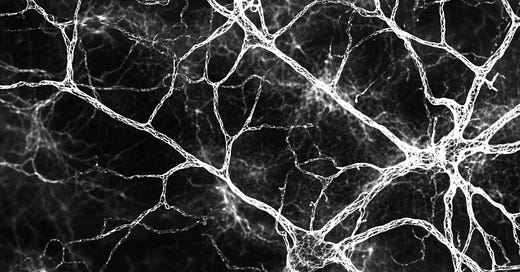




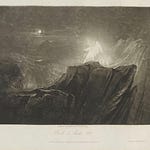

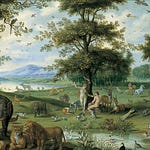
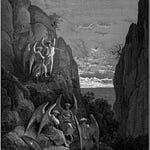
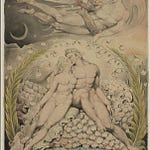
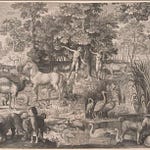
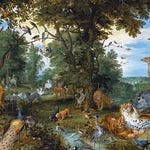
Share this post